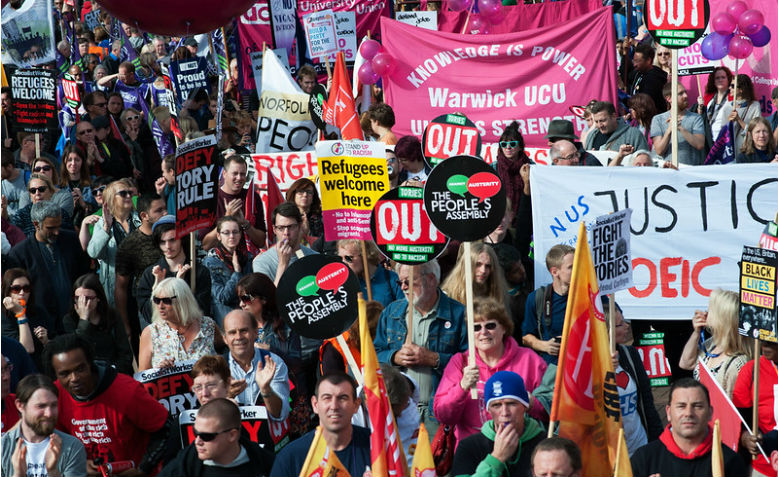 'Tories Out, Austerity Has Failed', Birmingham, 2016. Photo: Jim Aindow
'Tories Out, Austerity Has Failed', Birmingham, 2016. Photo: Jim Aindow
Strategy is important for the left now and it must go beyond who leads Labour next, argues Vladimir Unkovski-Korica
The defeat on 12th December is a blow to socialists inside and outside Labour. For a sizeable group in society, the Tory victory will be demoralising and will make resistance more difficult.
This is why many activists who joined Labour under Jeremy Corbyn will be reluctant to give up on their party which is an important institution of the working class in Britain.
Under Corbyn, the party grew to over half a million members, had immense reach and adopted a left programme.
To see that dissipate or be channelled behind a push to move the party more to the centre would rightly be seen as a further blow to the left across the UK.
It would therefore beneficial if the Labour left manages to present a credible united ticket in the forthcoming leadership election, fights for a left platform and stops the defeat turning into a rout. Another defeat would send even more people into passivity, cynicism and worse.
Rebecca Long-Bailey and Angela Rayner
There are hopes among many on the left that the announcement that Rebecca Long-Bailey and Angela Rayner will run for leader and deputy leader will do just that.
But leadership elections are unpredictable affairs, and there is no telling what will happen. The left needs to be cautious. Long-Bailey and Rayner are not candidates who have emerged from militant extra-parliamentary movements.
If Corbyn was the first leader in Labour history to break from the classic social-democratic approach of being progressive on domestic policy but timid on foreign policy – and even he had to make compromises on the second referendum, NATO and Trident – Long-Bailey is on the record saying she is prepared to push the nuclear button.
Long-Bailey, like her mentor McDonnell, has also been weak in resisting the offensive against Corbyn that centred on allegations of antisemitism. She has also pledged to maintain Chris Williamson’s exclusion from the Labour Party.
However, how she will respond to pressure from the right in the leadership election campaign remains open, and it is not impossible that she could move left. Socialists inside and outside the Labour Party can help shape the terrain on which the leadership battle is fought.
We should counter the argument that Labour would return to winning ways if it moves more to centre. Social-democracy across Europe has done so, and each time it has collapsed: look at France, Italy and Germany, where the centre-left is in deep trouble.
Moreover, we will enthuse no-one if our response to people who are bullied at work or who cannot afford food or shelter or who rely on public services facing cuts and privatisation that they should wait until December 2024 to elect the next Labour government. The fight-back needs to begin now.
We need an extra-parliamentary resistance
To counter the coming Tory onslaught, we will need to craft a strategy to fight back through extra-parliamentary means. This is not impossible. Look at France: months after Emmanuel Macron was elected, the gilets jaunes movement erupted.
More recently, a mass strike in France has developed and continued in France for three weeks. France’s pensions chief has just had to resign. This shows Macron’s ability to pass legislation depends not just on holding executive power but defeating organised resistance. So it will be for Johnson.
The organised left in Britain can do the same. We need to bring together trade unions, social and environmental movements, anti-racism campaigns, local anti-cuts groups, the anti-war movement, and many more, to build a massive resistance to Tory policies.
And, like Tony Benn, whose importance was greater for the Labour movement when he was part of the leadership of social movements like the Stop the War Coalition and the People’s Assembly against Austerity than when he was a Cabinet Minister, Corbyn has the potential to play a significant role.
The symbolism of having Corbyn prominently back on the campaign trail would raise the confidence of many of those who joined or voted Labour because of Corbyn’s tireless role in supporting extra-parliamentary movements over several decades.
And it would raise two fingers to the establishment who will be out to destroy him and everything that they feared for the last several years.
As we face the future, the left as a whole needs to recognise that the Labour Party is an important feature in the movement, but also that it does not encompass the entire working class. We need the broadest unity of the class, inside and outside the Labour Party.
And we need a socialist strategy for extra-parliamentary forms of struggle that can fight Boris Johnson in the here and now. This will be critical to raising the confidence of the mass of working class people whose resistance to the Tories matters if we want to stop them and build a truly hopeful alternative.
The revolutionary left has been an important part of such initiatives in the recent past and, the bigger it is, the more chance we have of success. For, if the last few years have taught us anything, compromises with the right lead to disaster. To defeat them, we need to be prepared to land a series of blows leading to the knock-out punch.

